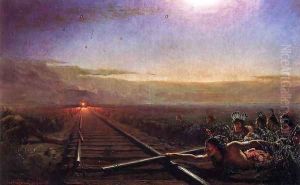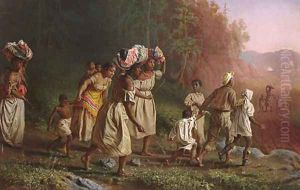Theodor Kaufmann Paintings
Theodor Kaufmann was a notable German-born American painter, born in Uelzen, Germany, in 1814, and who died in 1896. His life and career are characterized by his passionate engagement with themes of freedom, anti-slavery, and the American Civil War, reflecting his deep commitment to social and political issues of his time. Kaufmann's early years in Germany were marked by his involvement in the revolutionary movements that swept through Europe in the 1840s. This period of political unrest and his active participation in the revolutionary causes profoundly influenced his later work and ideals.
After emigrating to the United States in the late 1840s, Kaufmann became deeply involved in the American abolitionist movement and the fight against slavery. This was a time when the United States was deeply divided over the issue of slavery, leading up to the Civil War. Kaufmann's art from this period reflects his strong anti-slavery stance, with powerful depictions of the struggles and injustices faced by African Americans. His works during the Civil War period are particularly notable for their dramatic portrayal of battles, heroism, and the human cost of the conflict.
Kaufmann's style and technique were influenced by his European training, yet his subject matter was distinctly American, often focusing on the ideals of freedom and democracy that were central to the national identity of the United States during the 19th century. Despite his significant contributions to American art and his active engagement with pressing social issues of his time, Theodor Kaufmann remains a somewhat lesser-known figure in the pantheon of American artists. His works, however, continue to be studied and appreciated for their historical value and their powerful commentary on issues of justice, freedom, and human rights.

